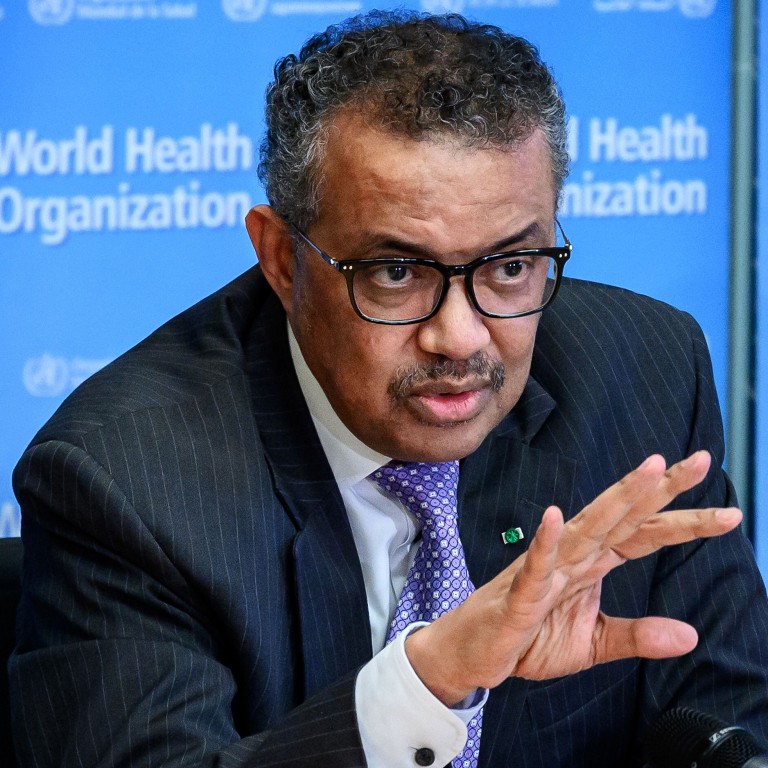
WHO chief calls decision to move forward with pandemic treaty ‘cause for hope’
- Member states agreed to set up intergovernmental body to negotiate and draft treaty or other pact during special session
- First meeting of the new body is to be held by March 2022, with an outcome to be submitted two years later
“The adoption of this decision is cause for celebration and cause for hope that we all need,” WHO chief Tedros Adhanom Ghebreyesus said in an address to member states at the close of the three-day meeting.
“Of course, there is still a long road ahead, there are still differences in opinion about what a new accord can or should contain. But you have proven to each other and the world that differences can be overcome and common ground can be found.”
Representatives of the WHO’s 194 member states at the World Health Assembly meeting agreed to establish an intergovernmental body to negotiate and draft a “WHO convention, agreement or other international instrument on pandemic prevention, preparedness and response”.
The future treaty or other agreement is meant to address weaknesses in the current global system and strengthen coordination on pandemic prevention and response. It could cover issues like access to vaccines and other medical products, data sharing, and the detection of emerging pathogens, world leaders supporting the treaty have said.
Countries agreed to hold the first meeting of the newly established body, which will be open to all members, by March 2022, with an outcome of their negotiations scheduled to be submitted to the WHA in 2024.
Experts say working out exactly what will fit within the scope of the document, where the red lines will be, and how a treaty or other pact would intersect with existing international agreements will be key challenges in the negotiation process. It is also not clear whether it will be a legally binding treaty or another type of agreement.
Former heads of pandemic review panel warn ‘the world is losing time’
Creating the negotiation body for a treaty or other agreement this week was a “significant move”, according to health governance expert and professor Sara Davies of Australia’s Griffith University.
“The real debate will be around the content of the treaty,” she said, pointing to a wide range of issues that could be up for consideration – from vaccine production and development and the powers of the WHO, to virus surveillance and information sharing, and travel barriers.
Meanwhile, this may need to take place alongside a separate reform of existing rules that govern public health emergencies, which a number of countries at the special session have also pushed for.
“There may be a sense that the treaty is where we want to go, but [reforming] the international health regulations are what we need right now, to deal with what we’ve got,” Davies said.
Lawrence Gostin, faculty director of the O’Neill Institute for National and Global Health Law at Georgetown University in Washington, agreed that navigating the breadth of a future international agreement, such as a treaty, would be a challenge.
“Should we actually take on all the big existential issues – climate, one-health approach, antimicrobial resistance, natural research, laboratory leaks?” he said.
Proposals for countries to cede their own sovereignty in the international health system – such as for independent verification of state reports, inspections or investigations of viral outbreaks and their origins – will also be “very thorny”, he said.
Meanwhile, hurdles to establishing international cooperation during the pandemic so far were likely to carry over into the negotiations, according to Thomas Bollyky, director of the global health programme at the Council on Foreign Relations in New York.
“Many low- and middle-income countries want greater assurances that they will receive more vaccines sooner in future crises and will have the ability to manufacture them. That won’t be an easy agenda on which to deliver in these negotiations of this international instrument,” he said, pointing to inequities in vaccine access between these and developed countries.
“We must guarantee that, if another pandemic strikes, we have the vaccines we need along with all other countermeasures … We simply cannot allow the same inequality we have seen, and continue to see, to repeat itself in future pandemics,” he said.
WHO starts data-sharing effort to prevent pandemics. Will nations cooperate?
The United States, which has previously focused on reforming existing rules, said it was committed to working with other countries on “developing a new WHO convention, agreement, or other international instrument”.
China also said it was open to efforts to strengthen global solidarity and coordination against future pandemics, noting that it “stood ready to maintain coordination and communication with all parties on forming a WHO convention, agreement or other international instrument”.
But while countries may support moving the negotiations forward, health security experts say the real test will be getting countries to sign an agreement.
Gostin said an outcome where a “slice of the world’s countries” sign on, but most or all of the major powers are missing could be one fate for a pandemic treaty.
“At the end of the day, any pandemic treaty that is adopted will be a coalition of the willing,” he said.

